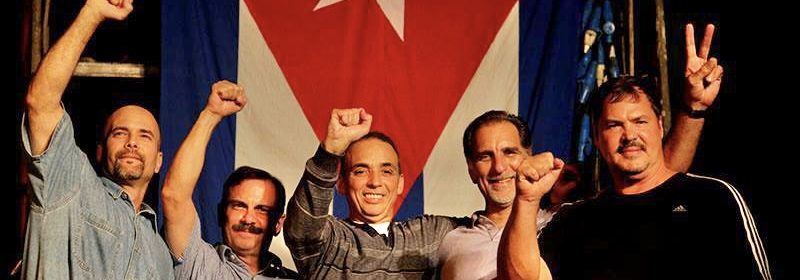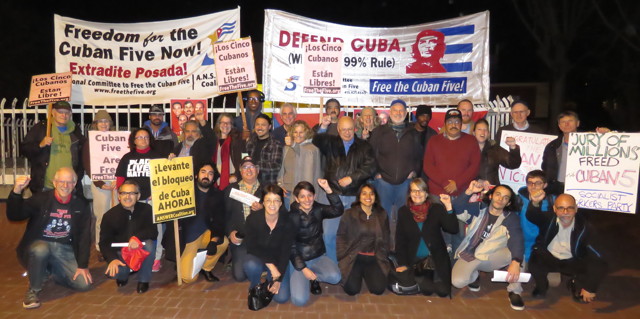The Significance of the Cuban 5 a Quarter of a Century since their Arrest

by Liset García
September 12, 2023
reprinted from Resumen Latinoamericano and the Third World
translated from Cuba en Resumen
The memory remains in the Cuban people for an event that occurred 25 years ago today. On September 12, 1998, five Cuban men were marked forever by the extreme hatred of those in Miami who have not ceased in attacking Cuba. That day they were arrested and their long battle for justice began.
Gerardo Hernandez, Ramon Labañino, Antonio Guerrero, Fernando Gonzalez and Rene Gonzalez were given brutal sentences ranging from 15 years to two life sentences, without being proven to be a danger to U.S. national security. They came to the US unarmed except for the love of their homeland to monitor the activities of heavily financed anti Cuba terrorist groups who were operating with impunity out of Southern Florida. Terrorists who were responsible for 3,500 deaths in Cuba since our revolution in 1959. The Cuban Five should have never been even detained but on September 12 the FBI stormed into their apartments and locked them up in solitary confinement for 17 months.
Their federal trial took place in the hostile atmosphere of Miami and was the longest in US history. The shadiness of the court proceedings failed to prove anything except the penetration of the Five, without weapons, into the terrorist groups to learn their criminal intentions. Except for failure to register as a foreign agents, all the charges including espionage, could not be proven so the convictions were all based on conspiracy to commit charges. Exposing the true political nature of the trials and the government’s hatred of Cuba the US justice system threw the book at them with long sentences. Ramon and Antonio got life sentences and Gerardo received 2 life sentences and 15 years.
As summarized by Cuban politician and diplomat Ricardo Alarcón de Quesada, the arrest took place almost three months after the visit to Havana of a high level FBI delegation that was given abundant documentation and testimonial information about terrorist plans against Cuba and the financial backing of the Miami-based Cuban American National Foundation (CANF).
CANF, it should be remembered, was responsible, for the lengthy record of services to the counterrevolution of terrorists like Luis Posada Carriles, the protagonist of many deadly like the mid-air explosion of a Cubana plane with 73 innocent people on board, off the coast of Barbados in 1976.
The material turned over the FBI in Havana detailed investigations of dozens of terrorist acts planned between 1990 and 1998, with photographs of weapons, explosives and other evidence, and additionally 51 pages of the list of CANF money destined to various groups to do harm within the country.
In addition, the FBI received the files of 40 terrorists of Cuban origin, most of them residing in Miami, and the data to find each one. Also, the recordings of telephone conversations of Posada Carriles giving instructions for plans of sabotage in Cuba and the information also included addresses of his homes in several countries, license plates of his cars and a list of places he frequented.
The U.S. delegation took samples of bombs deactivated at the Meliá Cohíba Hotel in April 1997, and in a tourist bus in October of the same year. Also, of the explosive device confiscated from two Guatemalans in March 1998, and the recordings of their statements, which clarify their links with Posada Carriles and Orlando Bosch.
When the FBI returned not a single piece of evidence was used to open up an investigation much less the arrest of any of the terrorists instead they went after the messengers. On September 12, the politically ambitious head of the FBI in Miami, Hector Pesquera, was all over the Miami media smiling with anti-Cuban member of congress, Ileana Ros Lehtinen and Lincoln Diaz-Balart, as he informed them of the arrest of the Five.
This jubilation did not last long because it was not long after that Fidel acknowledged publicly that the Five had been arrested and he vowed that they would Return. From that moment on the Cuban Five became the only political prisoners in the world that had the backing of entire country demanding their freedom.
More than 16 years later, after months of negotiations between the governments of Cuba and the United States, on December 17, 2014 the final three of the Five Heroes returned to their homeland to walk free and continue to be defenders of the Revolution and the right of Cuba to determine its own future.
The real reason for their release was not because the US somehow had a change of heart but rather through popular struggle. It was because of the unbendable bravery of the Cuban Five in deplorable US prisons, It was because of the relentless determination of their families who travelled the world as active agents in the battle for their freedom, it was because of the unwavering support of the Cuban people through all those years and it was also because of the strength of a worldwide solidarity movement that kept growing calling for their release. Committees in support of the Cuban Five sprung up in over 150 countries and no US Embassy in any part of the world was spared demonstrations demanding justice and their freedom.
The story of the Cuban Five, that began with their arrest 25 years ago today, is an important lesson that can still be applied today in our demands to end the unilateral blockade of Cuba and it gives the world hope that a better world is possible.
